HP Chromebook 11 Review
by Anand Lal Shimpi on October 15, 2013 2:45 AM EST- Posted in
- Laptops
- HP
- Chrome OS
- Chromebook
WiFi & Performance
WiFi on the Chromebook 11 is similarly well executed. There’s a 2-stream dual-band 802.11n controller inside, capable of negotiating at up to 300Mbps link rates. Given how uncommon finding 5GHz WiFi support was in cheap PCs from not too long ago, it’s good to see HP/Google choose properly here.
About my only complaint hardware wise on the Chromebook 11 is its SoC. HP settled on the same Exynos 5250 SoC that Samsung used in last year’s 11.6-inch Chromebook. Unfortunately, the design hasn’t aged well. Truth be told, there are far better options today than a dual-core 32nm 1.7GHz Cortex A15 design. I would’ve loved to have seen Bay Trail in the Chromebook 11, or at least a Snapdragon 800. I’ll get to the power consumption discussion in a moment, but performance of the Chromebook 11 really needs work. For single tasking, the 5250 is ok. Hitting heavier websites or scrolling while having a graph search overlay in Facebook will cause serious drops in UI frame rate.
Playing back HD videos in YouTube is borderline too much for the machine. If you try to play videos in the background while you browse the web, expect serious lag on the input front. I ran Kraken both with and without a background YouTube video playing just to show the impact of multitasking on performance:
| Multitasking Performance on Chromebook 11 | |||||||||||
| Kraken | Kraken + YouTube Video Playback | % Increase in Kraken Completion Time | |||||||||
| HP Chromebook 11 | 5262.4 ms | 10997.3 ms | 109% | ||||||||
Kraken took over twice as long to complete with YouTube actively playing in the background. The Chromebook 11 either needs more cores or better cores (or both) if you're going to be doing any sort of real multitasking/heavy web browsing.
Basic word processing using Google Docs is fine on the Chromebook 11, but again you need to make sure that you don’t have anything too CPU intensive in the background. Multitasking with Pandora is ok thankfully.
Our traditional js benchmark suite shows the relatively decent performance of Chrome + ARM's Cortex A15 at lightly threaded workloads. Single tasking shouldn't be a problem for this platform, it's the heavier workloads that will be problematic.
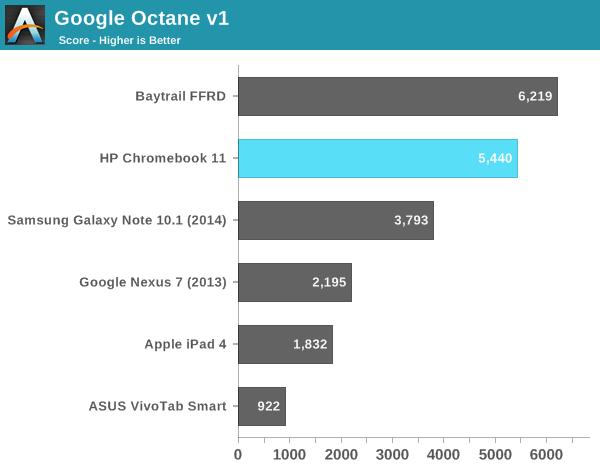
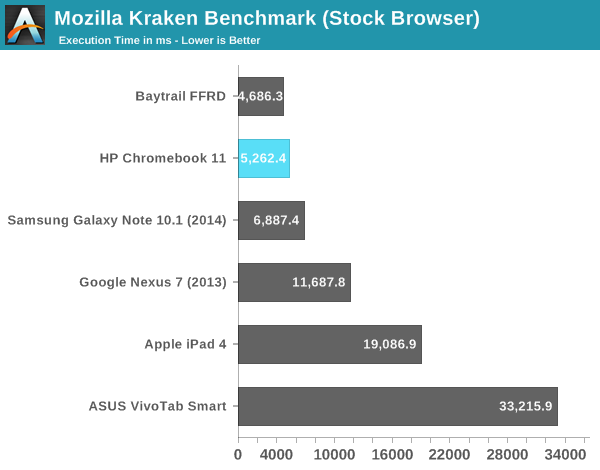
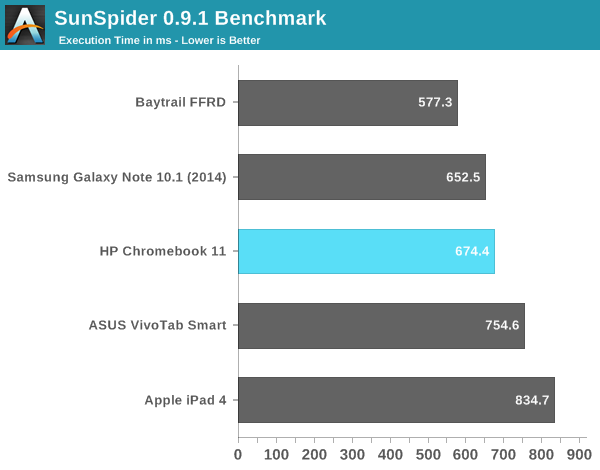
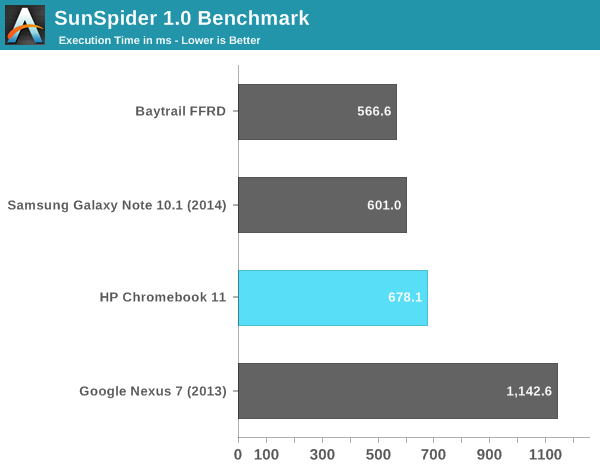


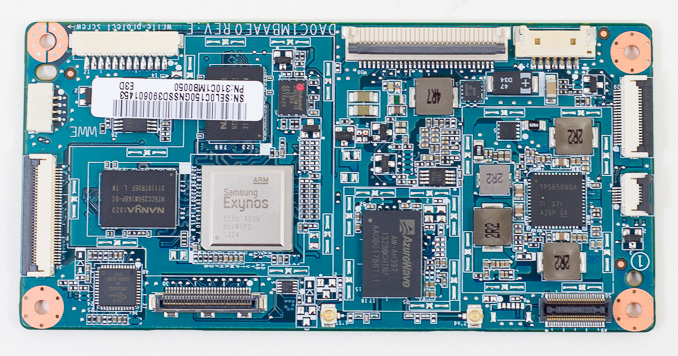
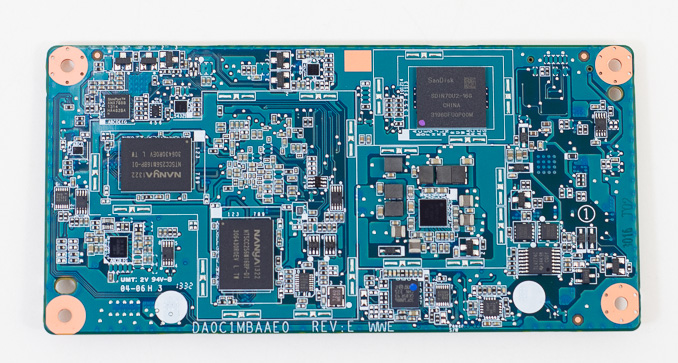








90 Comments
View All Comments
Klug4Pres - Tuesday, October 15, 2013 - link
It's great to see some of the effort that has been put into smartphones and tablets being applied to more traditional (and more functional) form factors.Haswell Celeron or Bay Trail do seem like a better match for this type of device, and a streamlined, more secure Windows, would make a better mainstream OS, but I'm not sure we will see that combination at this price point.
SM123456 - Wednesday, October 16, 2013 - link
The only gripe I have with the HP Chromebook 11 is the shorter 6 hr battery life compared with the 8hr battery life of the Acer 720 due to the HP's brighter screen and 2 cell battery instead if the Acer's 3 cell battery, even though the passively cooled HP draws less power than the Acer.The HP's screen is a lot better - better than the Macbook Air 11" even, and the speakers, keyboard, trackpad and build quality are also better. The passive cooling makes the HP completely silent, and more reliable because it has no moving parts. The Acer has a CPU cooling fan. The micro USB charger is a big plus.
The Acer is a little faster but not significantly - only 25% to 30% faster in terms of web benchmarks. The Acer has 4GB of RAM, which is useful if you have the habit of keeping open a large number of tabs, but the 2GB RAM in the HP is OK if like most people you don't have a large number of tabs open or try to play more than one movie at a time.
The HP lacks the HDMI port, USB 3.0 port, an Ethernet port, and the SD card port found on the Samsung ARM Chromebook. However the first three are not really a loss because the microSD port supports Slimport adapters which can give you an HDMI or Displayport output (when you are not charging) http://www.slimportconnect.com/ . The only thing that the USB port on a Chromebook is used for is to download files to, so the speed of the USB 3.0 will not be of any benefit. The only advantage of the USB 3.0 allows charging of the device it is on from a USB socket on another device, but since the HP already has a MicroUSB socket, this function is redundant. Again, like the Samsung ARM Chromebook, you can plug an Ethernet adapter into the USB socket if you want a wired connection. The lack of an SD card is a pity, but you can always use a USB flash drive if you need it. I guess Google is trying to reduce the number of sockets in the case for aesthetic reasons while maintaining the same functionality.
Having said all that I am still going to plum for the Acer. Why? Because of the battery life, and because of the option of running Linux on it with Chrome OS - for which the 4GB RAM and the Smartcard slot for more Flash memory.
Davidjan - Tuesday, October 22, 2013 - link
Good point. Meenova MicroSD reader works on it.Egg - Tuesday, October 15, 2013 - link
Blegh... I sort of want one, but the performance is really off-putting, as is the battery life.Google really needs to put more effort into getting Chrome OS more optimized... poor performance and battery life is not really excusable.
Egg - Tuesday, October 15, 2013 - link
I forgot to mention - do you plan on reviewing the 14" version? With a Celeron, performance issues should be mitigated.SInC26 - Tuesday, October 15, 2013 - link
Speaking of the Haswell Chromebooks, will the Acer C720 be reviewed? I think this is the more interesting product as it seems to have great battery life and solid performance. It compromises on the display quality, but for $250 and the ability to install a different Linux distro, it looks like a great portable laptop.Computer Bottleneck - Tuesday, October 15, 2013 - link
The ARM Chromebooks can also run Linux (via Crouton or ChrUbuntu):http://www.howtogeek.com/162120/how-to-install-ubu...
but it sounds like the situation is far more limited with ARM compared to x86.....
"On an ARM Chromebook like the Samsung Chromebook, you’re a bit limited in what you can do. Some programs don’t run on ARM, so you can’t run Minecraft and other closed-source applications that haven’t been compiled for ARM Linux. You have access to a variety of open source tools and desktop applications that can be recompiled for ARM, but most closed-source applications won’t work on ARM.
On an Intel Chromebook, you have much more freedom. You could install Steam for Linux, Minecraft, Dropbox, and all the typical applications that work on the Linux desktop, using them alongside Chrome OS. This means that you could install Steam for Linux on a Chromebook Pixel and gain access to a whole other ecosystem of games — if you were crazy enough to buy a Chromebook Pixel, of course."
Krysto - Tuesday, October 15, 2013 - link
"You could install Steam for Linux"And do what exactly? Bay Trail's GPU is even weaker than that last year Mali GPU. If Microsoft didn't build Windows RT the right way, to take advantage of legacy apps, I'm glad at least Chrome OS is ramping up competition for Intel in notebooks.
kyuu - Tuesday, October 15, 2013 - link
That doesn't make any sense. If you want Windows RT with legacy apps... that's regular Windows. There's no way to build WinRT with support for legacy apps because that would defeat the entire point of it. I'm glad of the competition, but I don't see why WinRT's lack of legacy app support is a deal breaker that pushes you to another platform... that also has no legacy app support (and is a much less fully featured OS besides).Besides the cheap hardware, I don't see any reason to choose ChromeOS over Windows RT. Unless you just really, really hate Metro, I guess.
mschira - Tuesday, October 15, 2013 - link
Correct me if I am wrong, but I don't think there is a proper clamshell device running RT. The tissue keyboard simply sucks.Maybe we will get a new Chromebook pixel with a better silicon at a slightly higher price.
Would be interesting.
M.